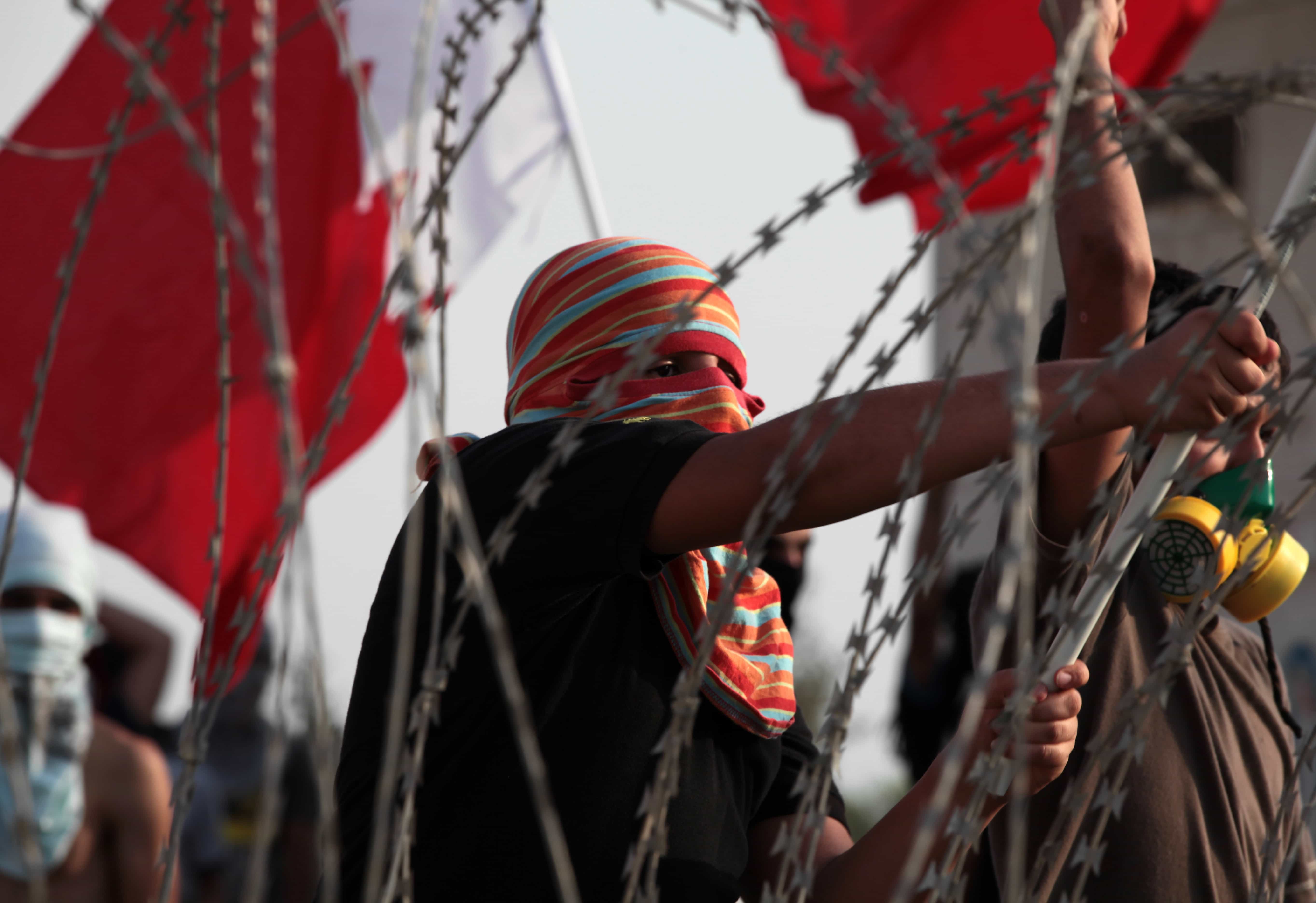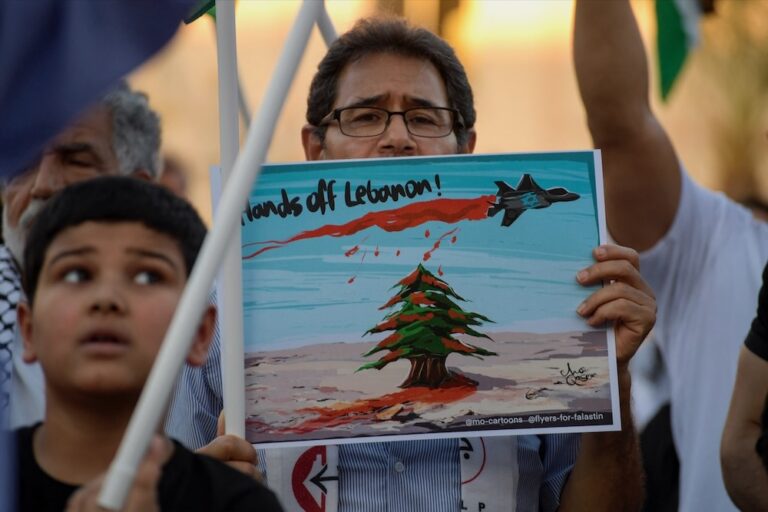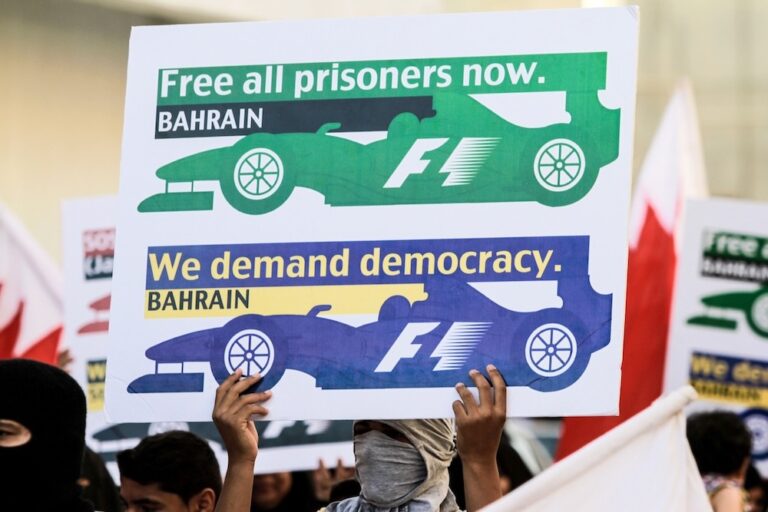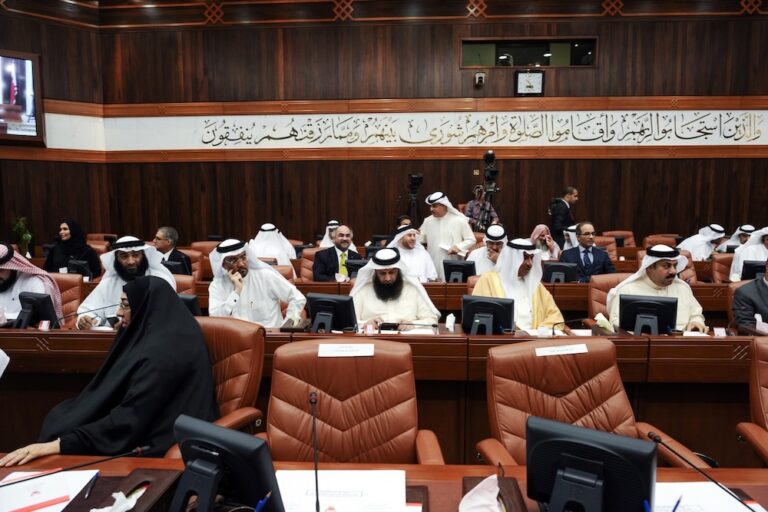Peaceful demonstrations took place across Bahrain on 14 August, despite attempts by the authorities to suppress them by blocking roads, setting up checkpoints and surrounding villages with barbed wire.
In Bahrain, checkpoints, roadblocks and barbed wire fences have been erected around villages and neighbourhoods near the capital city, Manama. Shop owners have closed down their stores as concrete barriers line major streets and hundreds of security forces in riot gear stand guard.
“They’re caging in entire villages with barbed wire,” said Maryam Al-Khawaja, acting president of the Bahrain Centre for Human Rights (BCHR) on 13 August, as she geared up for the next day.
These measures were taken as part of Bahraini authorities’ pre-emptive crackdown on a peaceful, nationwide protest that has been weeks in the planning.
International mainstream media’s meagre coverage of the struggle has done little to draw attention to developments that have led to this day of protest – 14 August 2013.
Spearheading the protests is the Bahrain Tamarod movement. It took its name from Egypt’s grassroots movement ‘Tamarod’, which organised the protests leading up to the ouster of President Mohammad Morsi after over a million Egyptians took to the streets in protest on 3 July.
The Bahraini opposition chose 14 August for its significance as the anniversary of Bahrain’s independence from Britain and the two-and-a-half-year anniversary of the start of pro-democracy protests. Demonstrations are planned to take place for three days.
In the past three months alone, Bahrainis have participated in more than 900 protests. Unlike other countries in the region, they have not been successful in catching the world’s attention but rather have faced a systemic crackdown by a government determined to silence dissent.
The run-up to Bahrain’s Tamarod protests has been met with a huge crackdown, with round-the-clock house raids, torture and ill-treatment of detainees, more arbitrary arrests, and tough prison sentences.
“It’s the 13th of August and the Bahrain regime is acting like it’s going to war, all people did was announce peaceful protests,” tweeted Al-Khawaja.
With many of the country’s most influential human rights activists and lawyers already behind bars, local rights groups have found themselves incapable of keeping up with the unfolding situation.
They issued a joint statement ahead of protests calling on mainstream media networks to dedicate particular attention to the situation in Bahrain in the build up to 14 August and to send journalists into the country, stressing that “what happens in the coming week will be critical.”
Sensing a threat to his rule, King Hamad issued new decrees on 6 August banning protests in the capital and giving the government greater power to arrest peaceful demonstrators and even to strip citizenship from those convicted of violence.
“The authorities plan to impose a news blackout on the 14 August demonstration by jailing netizens and preventing journalists and human rights defenders from visiting Bahrain,” said Reporters Without Borders earlier in the week.
Indeed, at least two bloggers, two photographers and a cameraman have been arrested since the end of July. In addition, Maryam Al-Khawaja who had hoped to visit her imprisoned father and sister as well as monitor the situation ahead of planned protests, was banned from boarding her flight to Bahrain on 9 August. Her sister, activist Zainab Al-Khawaja, is being held in unsanitary conditions in prison and has been banned from seeing her family.
“What I want to know is what the regime is so afraid of that they wud issue a ban preventing me from traveling to #Bahrain [sic],” tweeted Al-Khawaja to her more than 93,000 followers. The young activist and rights defender went into self-imposed exile in 2011 due to the oppression faced by her family.
According to Human Rights Watch, the Bahraini authorities have taken every possible step to ensure that there is no repeat of the 2011 anti-government protests, which were violently crushed and left 35 people dead.
A website called bahrainaugust14.com was set up on 10 August to offer a central space for news and information about developments ahead of the Tamarod protests but was blocked in Bahrain within 24 hours of launching. (Bahrainis can find the news on the group’s Facebook page.)
On 10 August, Bahrain’s Prime Minister Sheikh Khalifa bin Salman Al Khalifa issued a direct threat to the opposition, saying, “This island will burn to a cinder all those who seek to tamper with its security and stability.”
Despite knowing they could face harsh reprisals from Bahraini authorities, hundreds of protesters still showed up to participate in the nationwide demonstrations. Sporadic protests were held in the early morning in the villages of Malkiya, Juffair, Sitra, and others. Several pictures of human chains and peaceful sit-ins surfaced on Twitter, and protesters were later seen camping in front of their houses in the sweltering desert heat. According to main opposition group Al-Wefaq, there were over 60 protests in 40 locations at one point during the day.
It wasn’t long before the first arrests were made and reports of tear gas began to emerge. “We are very concerned that in the absence of international attention due to other events in the region the government of Bahrain will be even more severe in its crackdown against people practicing their right to freedom of expression and peaceful assembly,” said Al-Khawaja, “There have been peaceful protests in many areas around Bahrain, most of which were attacked by security forces. We have documented at least 15 arrests so far.”
In a message of support smuggled out of prison and posted on Facebook, prominent human rights defender Nabeel Rajab, currently serving a two-year sentence for calling for and participating in peaceful democracy protests, renewed his call for a Bahrain where there is “justice and equality between people and the protection of rights.”
“We should unify our ranks across all spectrums of society and should not surrender to sectarian schemes,” he said, addressing the government’s strategy of strengthening sectarian divisions and its tendency to dismiss the pro-democracy movement as an Iranian-backed attempt to install a Shiite theocratic state.
BCHR has documented several examples of the increasingly sectarian discourse being presented in the country’s mainstream media lately in an attempt to lessen support for the movement.
“So far, the response of the Bahraini authorities to the planned peaceful protests has been neither appropriate, nor proportionate,” said Nicholas McGeehan, Middle East researcher at Human Rights Watch. “In the long term, threats of violence and suppressing demonstrations are only likely to fuel tensions.”

Riot police catch a Bahraini anti-government protester in the village of Shakhura, Bahrain, on 14 August 2013AP Photo/Hasan Jamali



